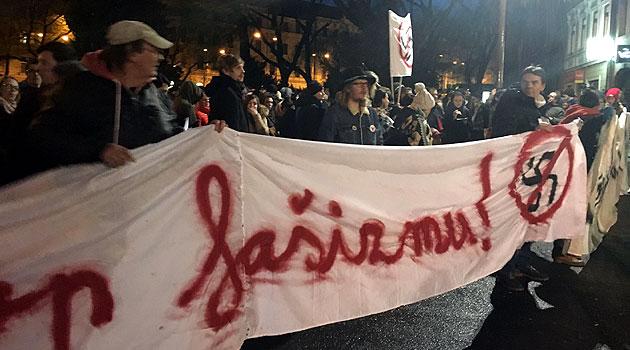Slovakia: Thousands protest Kotleba and clerical fascism in Bratislava

Slovak Police say more than 1 000 people assembled today in the center of Bratislava before marching through the streets of the capital to protest the ultra-right party of Marian Kotleba, the People’s Party Our Slovakia (LSNS), which scored gains in parliamentary elections this past weekend. The march was gradually joined by others and organizers estimate it reached between 2 000 and 3 000 people by the time it ended.
Media report that approximately 150 people turned out for a similar event in the town of Banská Bystrica. "This is a protest against the fact that a clerical fascist party has made it into Parliament. We lived through this once before, we do not want history to repeat itself. In addition to the [LSNS] openly espousing the clerical fascist legacy of the Slovak State and the war criminal Jozef Tiso, it also promotes hatred against all minorities, including people who hold minority opinions," a co-organizer of the Bratislava march, Eva Riečanská, told the Czech News Agency.
The success of the LSNS, which got 8 % of the vote and 14 seats in the 150-member legislature, was the biggest surprise of Saturday’s elections. The group led by right-wing radical Kotleba, who became the Governor of the Banská Bystrica Region through direct elections in 2013, won votes all over the country.
The party scored points in regions with high unemployment and, according to electoral estimates, most young people aged 18-21 voted for the LSNS. The party has promised in its program, among other things, to establish "order with the parasites in the settlements", to protect people from "Gypsy terror", to reject immigrants, to advocate for Slovakia leaving the "criminal NATO pact", and to hold a referendum on Slovakia leaving the EU.
The governing Směr-Social Democracy party of Slovak Prime Minister Robert Fico and the center-right parties are refusing to work with the LSNS. Slovak President Andrej Kiska did not invite representatives of Kotleba’s group to his meeting with the leaders of parties who made it into the legislature.
The LSNS disagrees that it is a neo-Nazi party. LSNS representative Milan Uhrík said during a post-electoral debate on television that the LSNS might seem somewhat extreme in comparison to what he called the "lukewarm" approach taken by the so-called standard political parties, who he alleged have not actually changed anything in Slovakia 26 years after the fall of communism.